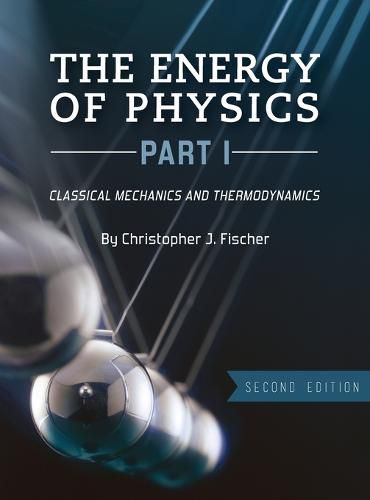Readings Newsletter
Become a Readings Member to make your shopping experience even easier.
Sign in or sign up for free!
You’re not far away from qualifying for FREE standard shipping within Australia
You’ve qualified for FREE standard shipping within Australia
The cart is loading…






This title is printed to order. This book may have been self-published. If so, we cannot guarantee the quality of the content. In the main most books will have gone through the editing process however some may not. We therefore suggest that you be aware of this before ordering this book. If in doubt check either the author or publisher’s details as we are unable to accept any returns unless they are faulty. Please contact us if you have any questions.
The Energy of Physics, Part I: Classical Mechanics and Thermodynamics provides students the opportunity to learn physics the way in which physicists understand the discipline. In contrast to standard textbooks, which introduce forces first, this text begins with classical mechanics using the concept of energy conservation. By inverting the standard order of presentation, the book enables students to understand and use calculus effectively, particularly toward applications in physics.
Energy conservation is a constant theme throughout the text. Newton’s laws are presented in terms of work and changes in kinetic energy, and forces are introduced as the derivative of potential energy, which is necessary for defining equilibrium conditions. A generalization of forces and Newton’s laws then motivates the concepts of linear and angular momentum. The mode of presentation also allows thermodynamics to be incorporated throughout the text.
The second edition includes a new chapter on fluids and new and additional practice problems for all chapters.
The Energy of Physics, Part I gives students a better understanding of classical mechanics and provides a solid foundation for more advanced physics concepts and courses. The text is ideal for calculus-based physics courses for science and engineering majors.
Christopher J. Fischer is an associate professor, the associate chair of the Department of Physics and Astronomy, and the director of the Engineering Physics Program at the University of Kansas, Lawrence. He holds a Ph.D. in applied physics from the University of Michigan, Ann Arbor. His research focuses on biophysics with an emphasis on understanding the function of molecular motors, especially those that manipulate DNA structure. He has been extensively involved in curriculum development at the University of Kansas, including the redesign of the introductory calculus-based physics sequence.
$9.00 standard shipping within Australia
FREE standard shipping within Australia for orders over $100.00
Express & International shipping calculated at checkout
This title is printed to order. This book may have been self-published. If so, we cannot guarantee the quality of the content. In the main most books will have gone through the editing process however some may not. We therefore suggest that you be aware of this before ordering this book. If in doubt check either the author or publisher’s details as we are unable to accept any returns unless they are faulty. Please contact us if you have any questions.
The Energy of Physics, Part I: Classical Mechanics and Thermodynamics provides students the opportunity to learn physics the way in which physicists understand the discipline. In contrast to standard textbooks, which introduce forces first, this text begins with classical mechanics using the concept of energy conservation. By inverting the standard order of presentation, the book enables students to understand and use calculus effectively, particularly toward applications in physics.
Energy conservation is a constant theme throughout the text. Newton’s laws are presented in terms of work and changes in kinetic energy, and forces are introduced as the derivative of potential energy, which is necessary for defining equilibrium conditions. A generalization of forces and Newton’s laws then motivates the concepts of linear and angular momentum. The mode of presentation also allows thermodynamics to be incorporated throughout the text.
The second edition includes a new chapter on fluids and new and additional practice problems for all chapters.
The Energy of Physics, Part I gives students a better understanding of classical mechanics and provides a solid foundation for more advanced physics concepts and courses. The text is ideal for calculus-based physics courses for science and engineering majors.
Christopher J. Fischer is an associate professor, the associate chair of the Department of Physics and Astronomy, and the director of the Engineering Physics Program at the University of Kansas, Lawrence. He holds a Ph.D. in applied physics from the University of Michigan, Ann Arbor. His research focuses on biophysics with an emphasis on understanding the function of molecular motors, especially those that manipulate DNA structure. He has been extensively involved in curriculum development at the University of Kansas, including the redesign of the introductory calculus-based physics sequence.